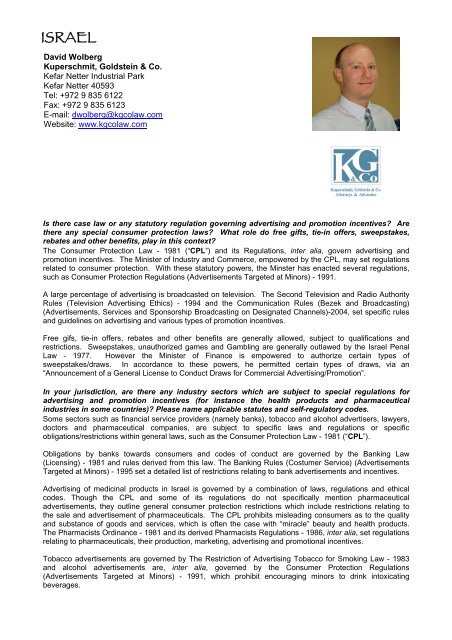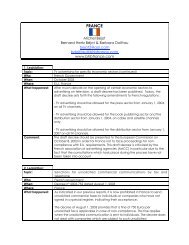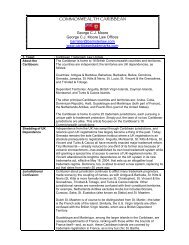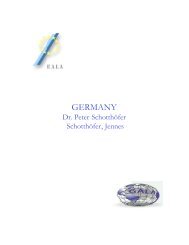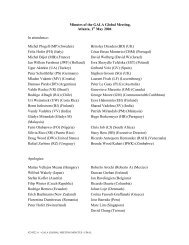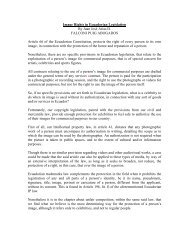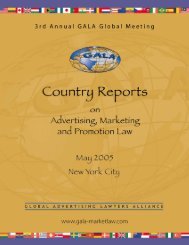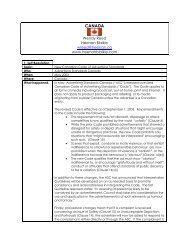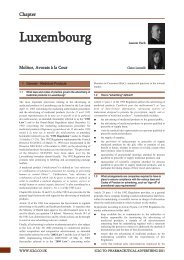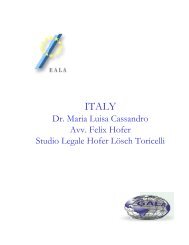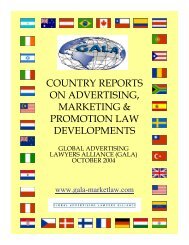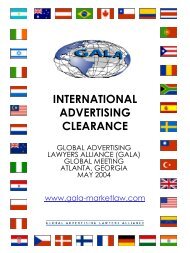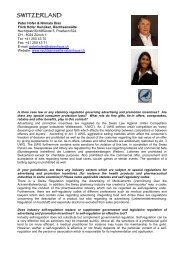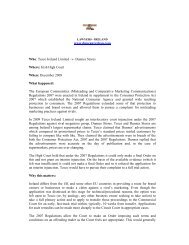ISRAEL - GALA
ISRAEL - GALA
ISRAEL - GALA
You also want an ePaper? Increase the reach of your titles
YUMPU automatically turns print PDFs into web optimized ePapers that Google loves.
<strong>ISRAEL</strong><br />
David Wolberg<br />
Kuperschmit, Goldstein & Co.<br />
Kefar Netter Industrial Park<br />
Kefar Netter 40593<br />
Tel: +972 9 835 6122<br />
Fax: +972 9 835 6123<br />
E-mail: dwolberg@kgcolaw.com<br />
Website: www.kgcolaw.com<br />
Is there case law or any statutory regulation governing advertising and promotion incentives? Are<br />
there any special consumer protection laws? What role do free gifts, tie-in offers, sweepstakes,<br />
rebates and other benefits, play in this context?<br />
The Consumer Protection Law - 1981 (“CPL”) and its Regulations, inter alia, govern advertising and<br />
promotion incentives. The Minister of Industry and Commerce, empowered by the CPL, may set regulations<br />
related to consumer protection. With these statutory powers, the Minster has enacted several regulations,<br />
such as Consumer Protection Regulations (Advertisements Targeted at Minors) - 1991.<br />
A large percentage of advertising is broadcasted on television. The Second Television and Radio Authority<br />
Rules (Television Advertising Ethics) - 1994 and the Communication Rules (Bezek and Broadcasting)<br />
(Advertisements, Services and Sponsorship Broadcasting on Designated Channels)-2004, set specific rules<br />
and guidelines on advertising and various types of promotion incentives.<br />
Free gifs, tie-in offers, rebates and other benefits are generally allowed, subject to qualifications and<br />
restrictions. Sweepstakes, unauthorized games and Gambling are generally outlawed by the Israel Penal<br />
Law - 1977. However the Minister of Finance is empowered to authorize certain types of<br />
sweepstakes/draws. In accordance to these powers, he permitted certain types of draws, via an<br />
“Announcement of a General License to Conduct Draws for Commercial Advertising/Promotion”.<br />
In your jurisdiction, are there any industry sectors which are subject to special regulations for<br />
advertising and promotion incentives (for instance the health products and pharmaceutical<br />
industries in some countries)? Please name applicable statutes and self-regulatory codes.<br />
Some sectors such as financial service providers (namely banks), tobacco and alcohol advertisers, lawyers,<br />
doctors and pharmaceutical companies, are subject to specific laws and regulations or specific<br />
obligations/restrictions within general laws, such as the Consumer Protection Law - 1981 (“CPL”).<br />
Obligations by banks towards consumers and codes of conduct are governed by the Banking Law<br />
(Licensing) - 1981 and rules derived from this law. The Banking Rules (Costumer Service) (Advertisements<br />
Targeted at Minors) - 1995 set a detailed list of restrictions relating to bank advertisements and incentives.<br />
Advertising of medicinal products in Israel is governed by a combination of laws, regulations and ethical<br />
codes. Though the CPL and some of its regulations do not specifically mention pharmaceutical<br />
advertisements, they outline general consumer protection restrictions which include restrictions relating to<br />
the sale and advertisement of pharmaceuticals. The CPL prohibits misleading consumers as to the quality<br />
and substance of goods and services, which is often the case with “miracle” beauty and health products.<br />
The Pharmacists Ordinance - 1981 and its derived Pharmacists Regulations - 1986, inter alia, set regulations<br />
relating to pharmaceuticals, their production, marketing, advertising and promotional incentives.<br />
Tobacco advertisements are governed by The Restriction of Advertising Tobacco for Smoking Law - 1983<br />
and alcohol advertisements are, inter alia, governed by the Consumer Protection Regulations<br />
(Advertisements Targeted at Minors) - 1991, which prohibit encouraging minors to drink intoxicating<br />
beverages.
Does industry self-regulation replace or supplement government and legislative regulation of<br />
advertising and promotion incentives? Is self-regulation an effective tool?<br />
The major self regulating bodies in the fields of advertising and promotion incentives are the Second<br />
Television and Radio Authority and the Cable and Satellite Counsel. The former body relates to<br />
advertisements on private television and radio stations (in contrast to state/national stations) and the latter<br />
body relates to advertisements on private television broadcasted through cable and satellite. However,<br />
these bodies are not industry self regulating bodies. Industry self regulating bodies do not play a significant<br />
role in the fields of advertising and promotion incentives and by no means replace government and<br />
legislative regulation. Though to a certain extent, they may supplement legislative and regulatory rules.<br />
To what extent do promotional incentives extended to staff in public institutions pose legal issues in<br />
your jurisdiction (i.e., paying for travel and accommodation costs on the occasion of conferences,<br />
personal entertainment, hidden education sponsoring, sponsoring of school snacks for promotional<br />
purposes)?<br />
Promotional incentives to staff at public institutions, though not specifically outlawed and existent in Israel,<br />
may be problematic in certain situations. In this context, it should be noted that according to Section 290(a)<br />
of the Israel Penal Law - 1977, “a public servant who accepts a bribe in return for an action related to his<br />
position, shall be liable to seven years imprisonment or seven years and a fine of ten thousand Liras”.<br />
Section 293 states that a bribe need not be in the form of money, rather, may also take the form of money<br />
equivalent or a benefit, if the bribe was given to induce or to result in favouritism or prejudice. Pursuant to<br />
Section 291, the bribe provider is also liable to penalties prescribed by the Penal Law. The above sections<br />
demonstrate that incentives targeted at staff in public institutions, in certain circumstances, may be<br />
problematic to both the incentive provider and receiver.<br />
Are there any formal disclosure requirements for promotional incentives (i.e., rule of separation of<br />
procurement from personal dealings, rules of employer consent requirements, written form<br />
requirements, adequacy of consideration granted for a service)?<br />
The Consumer Protection Law - 1981 (“CPL”) sets general rules designed to protect consumers against<br />
misrepresentation and deception, which are relevant to promotional incentives. Additionally the CPL has<br />
specific rules which demand full disclosure of the goods within the promotion. Promotional incentives via<br />
draws, are governed by the “General License to Conduct Draws for Commercial Advertising/Promotion”. The<br />
General Licence sets strict disclosure demands relating to, inter alia, the promotion organizer(s), the<br />
promotion framework, rules and prizes.


